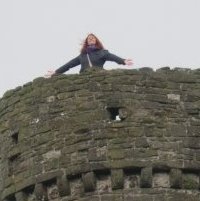 Kit Kapphahn is in the writing up year of a Ph.D. in Celtic Studies at Aberystwyth University, where her work focuses on the development of literary portrayals of gender in Welsh Arthurian literature. She is also a reviewer for Hortulus
Kit Kapphahn is in the writing up year of a Ph.D. in Celtic Studies at Aberystwyth University, where her work focuses on the development of literary portrayals of gender in Welsh Arthurian literature. She is also a reviewer for Hortulus
My First Conference Paper
 My first conference paper was at an interdisciplinary postgraduate conference in Bangor under the theme ‘Truth and Lies’. I was writing up my MA thesis and wouldn’t be starting my Ph.D. for another few months, but wanted to get a head start on presenting at conferences as I was, at the time, a self-funded international student (a topic for a whole different post). I’m not afraid of public speaking—my first degree is in Communication, which I changed to from Drama, and I used to be a radio presenter—but there’s always that inevitable nervousness at the idea of having to defend your ideas to colleagues.
My first conference paper was at an interdisciplinary postgraduate conference in Bangor under the theme ‘Truth and Lies’. I was writing up my MA thesis and wouldn’t be starting my Ph.D. for another few months, but wanted to get a head start on presenting at conferences as I was, at the time, a self-funded international student (a topic for a whole different post). I’m not afraid of public speaking—my first degree is in Communication, which I changed to from Drama, and I used to be a radio presenter—but there’s always that inevitable nervousness at the idea of having to defend your ideas to colleagues.
 This wasn’t something I needed to worry about, in the end. Despite the conference being held in Wales, I was the only one talking about anything Welsh or historical. The other papers involved a lot of fandom and cultural media studies, which was interesting, but there was very little chance anyone was going to challenge my interpretation of middle-Welsh poetry. While originally slated to share a panel with a paper on Mary Queen of Scots and James IV, I was moved around when that person wasn’t able to come after all, and ended up on a panel with a woman whose paper dealt with Nietzsche’s influence on modern art in 1960s London. Neither of us had the faintest idea what the other was talking about.
This wasn’t something I needed to worry about, in the end. Despite the conference being held in Wales, I was the only one talking about anything Welsh or historical. The other papers involved a lot of fandom and cultural media studies, which was interesting, but there was very little chance anyone was going to challenge my interpretation of middle-Welsh poetry. While originally slated to share a panel with a paper on Mary Queen of Scots and James IV, I was moved around when that person wasn’t able to come after all, and ended up on a panel with a woman whose paper dealt with Nietzsche’s influence on modern art in 1960s London. Neither of us had the faintest idea what the other was talking about.
Nor did anyone who came to listen, except for the single friend I’d dragged along for moral support, so when my paper turned out to be clearly too long for the allotted twenty minutes, I cut it down by just skipping over several pages of linguistic and philological discussion in the middle (and acknowledged I was going to do it, to a response of slightly sheepish giggles). The Q&A was almost non-existent; the same friend who’d come with me asked something sensible, and a brave lad in the front row asked, ‘So is that a bit like Beowulf?‘ This was my own fault – the abstract had mentioned Beowulf, and in a longer paper I would have likely been able to address some of the connections between them. I did my best with it, and then we all went to have some tea.
 I made a lot of mistakes in this conference. Fortunately they were useful ones, and I got them all out of the way at once in a fairly non-threatening environment. Even though I’d practiced, the paper was still too long, which meant I talked too quickly. I sat down rather than standing to present it, which feels more comfortable at the time but is almost never a good idea—you need the authority that standing provides, and it also means people can see and hear you better. It was also too advanced for the audience; there’s a definite knack to aiming your presentation for interdisciplinary gatherings that’s different from talking to experts in your own field. I didn’t have a handout, originally for environmental reasons—really, people just throw them away—but in retrospect it would have been useful to show some of the phrases I was dealing with, or at least provide translations. (It’s quite common in Celtic Studies not to use Power Point presentations, because the nature of the material often means they’re just lists of bullet points with unrelated pictures and can really detract from the talk itself. I’m always a bit jealous of people in things like Art History that lend themselves to sensible Power Points.) Since then I always have either a handout or a Power Point, depending on the paper itself and how much I trust the technology at wherever I’m going to be presenting. (It’s also worth noting that if you are going to use Power Point, have backups. Email the organisers the file, email yourself the file, bring it on a USB stick, and if possible have it along with you loaded on your own computer. Technology hates you. Never forget this.
I made a lot of mistakes in this conference. Fortunately they were useful ones, and I got them all out of the way at once in a fairly non-threatening environment. Even though I’d practiced, the paper was still too long, which meant I talked too quickly. I sat down rather than standing to present it, which feels more comfortable at the time but is almost never a good idea—you need the authority that standing provides, and it also means people can see and hear you better. It was also too advanced for the audience; there’s a definite knack to aiming your presentation for interdisciplinary gatherings that’s different from talking to experts in your own field. I didn’t have a handout, originally for environmental reasons—really, people just throw them away—but in retrospect it would have been useful to show some of the phrases I was dealing with, or at least provide translations. (It’s quite common in Celtic Studies not to use Power Point presentations, because the nature of the material often means they’re just lists of bullet points with unrelated pictures and can really detract from the talk itself. I’m always a bit jealous of people in things like Art History that lend themselves to sensible Power Points.) Since then I always have either a handout or a Power Point, depending on the paper itself and how much I trust the technology at wherever I’m going to be presenting. (It’s also worth noting that if you are going to use Power Point, have backups. Email the organisers the file, email yourself the file, bring it on a USB stick, and if possible have it along with you loaded on your own computer. Technology hates you. Never forget this.
 The Bangor conference was deliberately set up as a practice run for postgrads, and that was a really useful way to get started. They hired a student crew to film everyone’s talks, so afterward you got a souvenir USB stick with a video file of your presentation on it; then in the privacy of your own home you could look back over it, cringe, and take all the notes necessary on how to improve next time. I’ll be honest, I never made it all the way through watching mine; it was just too cringeworthy. But I did get enough out of it that when, a year later, I did two of the biggest worldwide conferences in my field, I was confident and awesome and even managed to help out some other postgrads who were far more nervous than me. Conferences can be a lot of fun, and I’ve found that no matter how nervous I am at the very beginning, as soon as I get started I loosen up. It’s just talking about my research to people who might be interested in it, and I love that. It’s exciting! Not to mention it’s a great way to get feedback on your ideas and meet other people in your field.
The Bangor conference was deliberately set up as a practice run for postgrads, and that was a really useful way to get started. They hired a student crew to film everyone’s talks, so afterward you got a souvenir USB stick with a video file of your presentation on it; then in the privacy of your own home you could look back over it, cringe, and take all the notes necessary on how to improve next time. I’ll be honest, I never made it all the way through watching mine; it was just too cringeworthy. But I did get enough out of it that when, a year later, I did two of the biggest worldwide conferences in my field, I was confident and awesome and even managed to help out some other postgrads who were far more nervous than me. Conferences can be a lot of fun, and I’ve found that no matter how nervous I am at the very beginning, as soon as I get started I loosen up. It’s just talking about my research to people who might be interested in it, and I love that. It’s exciting! Not to mention it’s a great way to get feedback on your ideas and meet other people in your field.
In the end, it’s important to remember that we all have to start somewhere! Bite the bullet, jump in at the deep end, whatever; pick your metaphor of choice and just do the best you can. Even if it goes horribly wrong—and it probably won’t—it’ll be a good story later. Good luck!
1 Comment on “My First Conference Paper”